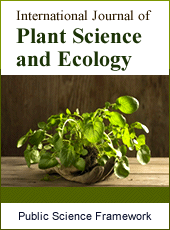International Journal of Plant Science and Ecology
Articles Information
International Journal of Plant Science and Ecology, Vol.1, No.3, Jun. 2015, Pub. Date: May 18, 2015
In-Vitro Evaluation of Plant Extracts Against Colorectal Cancer Using HCT 116 Cell Line
Pages: 107-112 Views: 5992 Downloads: 3064
[01]
Shruti Bandopadhyaya, PG Department of Biotechnology, CMR Institute of Management Studies (Autonomous), # 5, 2nd Cross, 4th Main OMBR Layout, Bangalore, Karnataka, India;Stem Cell Biology Laboratory, L V Prasad Eye Institute, Hyderabad, India.
[02]
Mani Ramakrishnan, PG Department of Biotechnology, CMR Institute of Management Studies (Autonomous), # 5, 2nd Cross, 4th Main OMBR Layout, Bangalore, Karnataka, India.
[03]
Ramesh Puttalingaiah Thylur, Drug Discovery Research Lab, Skanda Life Sciences Pvt. Ltd., Sunkadakatte, Bangalore, Karnataka, India.
[04]
Yogisha Shivanna, Drug Discovery Research Lab, Skanda Life Sciences Pvt. Ltd., Sunkadakatte, Bangalore, Karnataka, India.
Mammalian tumour cells exhibit resistance to chemotherapy and its severe side effects reduces the clinical efficacy of a large variety of anticancer agents. Plant-derived compounds manifest many beneficial effects and can possibly inhibit several stages of cancer. Despite there is significant progress in cancer therapeutics in the last decades, the need to discover, develop new and synergistic plant based anticancer agents are in the emerging stage. In the present study, we attempted to exploit bioactive compounds of three plants viz. Cinnamomum camphora, Catharanthus roseus and Emblica officinalis, investigated their anti-proliferative properties for colon cancer and evaluated the haemolytic activity. Methanol extracts of these plants were subjected to cytotoxic assay and found that C. roseus and E. officinalis selectively inhibited hct 116 cell proliferation and all the three plants are non-haemolytic. Our findings infer that the potential bioactive compounds of these plants have vibrant chance to fight colon cancer as were seen to be non-haemolytic to blood cells and they are well documented as a traditional medicine for therapeutic uses.
Cinnamomum camphora, C. roseus and Emblica officinalis, HCT 116 Cell Line, Cytotoxic Assay, Alkaloids, Anti-Proliferative Activity, Haemolytic Activity
[01]
Hejmadi M; How cancer arises? In ‘Introduction to cancer biology’, Ed. Hejmadi M Ventus Publishing ApS, United Kingdom, pp 6-12 (2009).
[02]
Tomasetti C, B Vogelstein; Variation in cancer risk among tissues can be explained by the number of stem cell divisions,Science, 347 (6217): 78 (2015). DOI: 10.1126/science.1260825
[03]
Timothy J Y, Colon Cancer; University of South Florida, Encyclopaedia of life Sciences, Nature Publishing Group, 1-2 Tropical Botanical Gardens. (2001). http:/www.els.net
[04]
Gordon M C, J David; Plants as anticancer agents, Journal of ethnopharmacology. 72-75 (2005).
[05]
Wasundara F and H P Vasantha; Anticancer properties of phytochemicals present in Medicinal plants of North America (2012).
[06]
Sumitra C and N Kurnal; In vitro and In vivo methods for anticancer activity evaluation and some Indian medicinal plants possessing anticancer properties: A Review, Journal of Pharmacognosy and Phytochemistry, IC 8192 (2) (2013).
[07]
James R H; Natural Products; the Secondary Metabolites, the Royal Society of Chemistry, UK, (10):1039-40 (2003).
[08]
Pandey Govind; Some important anti-cancer herb- a review, International Research of Pharmacy, 2(7); 45-52 (2011).
[09]
Parimalakrishnan Sundararajanet; Studies of Anticancer and Antipyretic Activity of Bidenspilosa whole plant, African Health Sciences, 6(1):27-30 (2006).
[10]
C Yompakadee, S Thunyaharan; Bacterial activity of methanol extracts of Crabapple, Mangroove Tree against multidrug resistant pathogens, Indian Journal of Pharmaceutical Sciences, 74(3): 230-236 (2012).
[11]
Romijn J C, C F Verkoelen and F H Schroeder; Application of the MTT assay to human prostate cancer cell lines in vitro: Establishment of test conditions and assessment of hormone- stimulated growth and drug induced cytostatic effects. The Prostate, 12(1):99-110 (1988).
[12]
Mebrahtom Gebrelibanos; In-vitro Erythrocyte Haemolysis Inhibition Properties of Sennasingueana Extracts, Momona Ethiopian Journal of Sciences, 4(2): 16-28 (2012).
[13]
Mehboob Hoque, Sandeep Dave, Pawan Gupta, Mohammed Saleemuddin; Oleic Acid May Be the Key Contributor in the BAMLET Induced Erythrocyte Haemolysis and Tumoricidal Action. Plosone: 8(9) 68390(2013).
[14]
Ibrahim I H; Oxidative Haemolysis of Erythrocytes Induced by Various Vitamins, International Journal of Biomedical Sciences, 95-298 (2006).
[15]
Ricardo C B, A L Monica, M G Sonia, M B Fabiana, M A Priscila; A simple method to measure cell viability in proliferation and cytotoxic assays. Braz Oral Res, 23(3): 255-62 (2009).
[16]
Tatsuya Kaneshiro, Masumi Suzui, ReikaTakamatsu, Akira Murakami, Hajime Ohigashi, Tetsuya Fujino, Naoki Yoshimi; Growth Inhibitory Activities of Crude Extracts Obtained from Herbal Plants in the Ryukyu Islands on Several Human Colon Carcinoma Cell Lines, Asian Pacific J Cancer Prev, 6, 353-358 (2005).
[17]
Rafie H, H Soheila, H Mohsen, S Mina; Camphor (Cinnamomum camphora), a traditional remedy with history of treating several diseases. International journal of case reports and images; 4(2): 86-89 (2013).
[18]
Gajalakshmi S, S Vijayalakshmi; Pharmacological activities of Catharanthus roseus: A Perspective Review, International Journal of Pharma and Bio Sciences 4(2): 431 – 439 (2013).
[19]
Ekta S, S Sheel; Phytochemistry; traditional uses and cancer chemopreventive activity of Amla (Phyllanthus emblica): The Sustainer. Journal of Applied Pharmaceutical Science 02 (01); 176-183 (2011).
[20]
Seham M A Moustafa, M Bassem. Menshawi, Gamila M. WASSEL, Khaled Mahmoud, Marwa, M Mounier; Screening of some Plants in Egypt for their Cytotoxicity against four Human Cancer cell lines. International Journal of PharmTech Research; 6 (3): 1074-1084 (2014).
[21]
Irma P, Agnieszka G, S Danuta; Saponins as cytotoxic agents: a review. Phytochem Rev; 9: 425-74 (2010).

ISSN Print: 2381-6996
ISSN Online: 2381-7003
Current Issue:
Vol. 7, Issue 4, December Submit a Manuscript Join Editorial Board Join Reviewer Team
ISSN Online: 2381-7003
Current Issue:
Vol. 7, Issue 4, December Submit a Manuscript Join Editorial Board Join Reviewer Team
| About This Journal |
| All Issues |
| Open Access |
| Indexing |
| Payment Information |
| Author Guidelines |
| Review Process |
| Publication Ethics |
| Editorial Board |
| Peer Reviewers |


